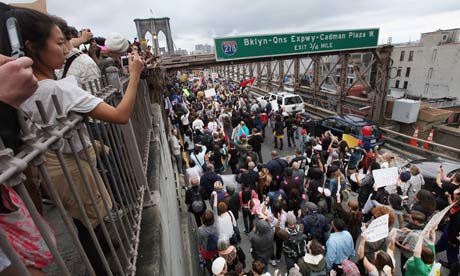Prosecutor is trying to subpoena three months of tweets, but service argues content belongs to users, not the company

Malcolm Harris was among some 700 protesters who were arrested in October during a march across the Brooklyn Bridge. Photograph: Mario Tama/Getty Images
Twitter has moved to quash a court order issued by the Manhattan district attorney that would require it to hand over the tweets of a writer and Occupy Wall Street protester arrested on the Brooklyn Bridge last October.
In a motion filed in the criminal court in New York on Monday Twitter argued that it should not be forced to give the prosecutor three months worth of tweets by Malcolm Harris, who was arrested on the bridge along with 700 other activists.
Harris had issued his own motion in a bid to quash the subpoena in February, contending that there was "no justification" for New Yorkprosecutors to seek "such a broad swath of electronic data". The motion was rejected by Judge Matthew A Sciarrino Jr on 20 April, in an order ruling that Harris did not have the legal standing to challenge the subpoena because Twitter owned the rights to his tweets.
Twitter filed a ten-page memorandum against Sciarrino's order on Monday, writing that its terms of service "make absolutely clear that its users own their content", giving users the right to move to quash subpoenas themselves.
"Terms of service expressly state: 'You retain your rights to any content you submit, post or display on or through the services'," the memorandum reads.
Twitter provided two additional reasons why the subpoena should be quashed, one saying the order is effectively "forcing [Twitter] to violate federal law". The social networking site argues the subpoena violates the fourth amendment, which requires a search warrant before companies hand over subscribers' communications.
Twitter also contended that the subpoena does not comply with the Uniform Act, which requires prosecutors to present "appropriate certification to a California court" before compelling a California company to produce documentation.
Harris was arrested in October and charged with disorderly conduct for his participation in an Occupy Wall Street march that ended with some 700 arrests after protesters walked onto the road section of the Brooklyn Bridge. New York prosecutors issued a subpoena to Twitter on 26 January, requesting three months worth of tweets from Harris's twitter account as well as "user information, including email address".
The New York Times has reported that prosecutors want to see three months of Harris's tweetsin the belief they may contradict his potential defence that police allowed protesters to walk in the road.
"The defendant may have used the account to make statements while on the bridge that were inconsistent with his anticipated trial defense," the Times quoted assistant district attorney Lee Langston as saying.
Harris is not the first Twitter user to be subpoenaed by a US prosecutor. In January 2011 an Icelandic MP's tweets were the subject of an order from the US justice department as part of an investigation into WikiLeaks.
Birgitta Jonsdottir lost her legal battle against in November when a judge ruled Twitter must release her details. In that case, as with Harris, Jonsdottir only heard of the subpoena request when Twitter challenged the court order.
Ben Lee, legal counsel for Twitter, said in a statement: "As we said in our brief, Twitter's terms of service make absolutely clear that its users own their content. Our filing with the court reaffirms our steadfast commitment to defending those rights for our users."
Earlier, the company's communications account, @twittercomms, posted a link to an American Civil Liberties Union article about the case.
"It's not every day the @ACLU says something's a 'big deal' – Twitter Stands Up For One Of Its Users," the tweet said, quoting the headline on the ACLU's story.
No comments:
Post a Comment